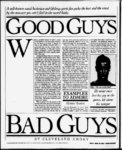| OCR Text |
Show by letting the whole damned world know about it.) John McEnroe Ilie Nastase,' at least, was usually funny. Jimmy Connors, awful as he once was, is now, at least, less awful. Vitas Gerulaitis is surelv no model (except maybe in a sartorial sense). But McEnroe remains the Godzilla of the tennis courts. Hell do anything to win to psych the umpire and the linespeople, to break his opponents concentration. Watching McEnroe, even at the safe distance of television, is an exercise in ours, obviously, not his. The best you can say for him is that he has made the self-contr- ol American tennis ian a true internationalist. One roots for Ivan Lendl as if he were a hometown boy. Called by The Washington Post the Prince of Pique, he was perhaps best summed up by the English sportswritcr Jean Rook. Loud, rude, vain, childish, she wrote, sulky and bloody-mindeJohn McEnroe is a spoiled child only d, McEnroe the Godzilla of the courts Watching McEnroe id an exercue in control ourj -- some, durable Sheridan console cabinet to go with it, absolutely free: It makes sewing easier and is a perfect home for your new Singer sewing machine. Or if you prefer, you can apply the cabinet value towards the price of one of our other fine sewing cabinets. After all, itfc up to you. his mother could love. Perhaps somewhere, sometime, some official will overcome the appalling timidity shown toward McEnroe and rememberthat, once upon a time, there was another era in tennis. In that era, Earl Cochell, a top player, heckled by a spectator during a match at Forest Hills, made an obscene gesture with his racquet. A gesture, mind you. For that the U.S. Lawn Tennis Association banned him for life. Bobby Fischer Nice guys may or may not, in Leo Durochers words, finish last, but at least they do finish. The same cannot be said for the greatest of all chess champi- ons of this century. Bad sport as he was when he lost, Fischer as a winner proved to be even worse. In losing, he at least had a point: The Russians did, in international tournaments, agree to declare draws when playing each other in order to save themselves for opponents. But after he finally won, Fischer was not satisfied with making the International Chess Federation do something about that. He went on to make a host of other demands including that any challenge had to be won by two games and, in the end, he lost everything, the championship reverting to the Russians. A child, which Fischer no longer was , could have told him what would happen. It was one more proof that complaining always dangerous where sportsmanis particularly so in ship is concerned chess, where excuses count for little. In a tournament many years ago, the great English chess champion Sir George Thomas faced a youngster who complained of a headache. Sir George fixed him with a steely eye. Young man," he said, "in 40 years of tournament playing. I do not believe that I have ever defeated a wholly well man. non-Russi- g |







































































































































































































































